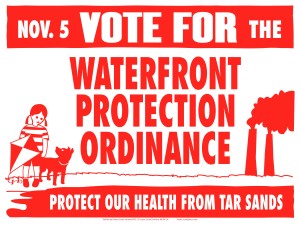We have much more to do and your continued support is needed now more than ever.
The South Portland, Maine Vote to Protect Wildlife from Dirty Oil

Right now, Big Oil is trying to pump millions of gallons of dirty tar sands oil through sensitive wildlife habitat—crossing pristine lakes, rivers and streams—and load it onto massive export tankers at the South Portland, Maine waterfront. From fragile starfish living deep in Casco Bay to young moose feeding in the Androscoggin River, this puts our New England wildlife at risk.
Big Oil is outspending local activists 10 to 1 to stop a South Portland, ME vote that will protect the waterfront from tar sands oil. The South Portland Waterfront Protection Ordinance ballot on Nov. 5th is just one step in the fight to protect our wildlife and keep New England tar sands free!
What’s the Big Deal?
If Big Oil is allowed to bring tar sands oil to the South Portland waterfront, an export facility would be built—harming our air and waters. Two new 70 foot smokestacks, burning off toxic chemicals from the tar sands oil before being loaded into tankers, could spew deadly benzene into the air and into the waters of Casco Bay. Once loaded and moving through the bay, the oil tankers could flounder on the rocky Maine seacoast, resulting in a tar sands oil spill that would devastate wildlife habitat.
A tar sands spill from the 63 year-old Enbridge/Exxon pipeline (which crosses the Androscoggin River and runs along Sebago Lake as it makes it way to South Portland) would be devastating for moose and other wildlife. Toxic tar sands oil could flow into the river and along our shorelines, polluting the fresh water that moose depend on for survival.
Protecting wildlife from a tar sands oil spill would be difficult if not impossible. Tar sands oil sinks quickly in water, where it would harm wildlife from the surface waters to the floor of the bay or our rivers. Tar sands oil has also proven to be almost impossible to clean up, requiring dredging operations that could cause even further environmental harm.
Tar Sands Oil Spills are Devastating
 We don’t need to imagine what a tar sands oil spill would be like, because we have seen the effects on the Kalamazoo River in Michigan and in a suburban neighborhood in Mayflower, Arkansas. Close to a million gallons were spilled in Kalamazoo, causing $1 billion in clean-up efforts, releasing toxic chemicals into the air and water, and contaminating wildlife habitat.
We don’t need to imagine what a tar sands oil spill would be like, because we have seen the effects on the Kalamazoo River in Michigan and in a suburban neighborhood in Mayflower, Arkansas. Close to a million gallons were spilled in Kalamazoo, causing $1 billion in clean-up efforts, releasing toxic chemicals into the air and water, and contaminating wildlife habitat.
Right now, wildlife advocates in South Portland, Maine and across New England have an opportunity to help stop tar sands in the northeast.
On Nov. 5, South Portland Maine voters can cast their ballots FOR the Waterfront Protection Ordinance.
Even if you cannot vote in this important election, you CAN make a difference!
Update: Despite a tremendous grassroots effort and widespread opposition to tar sands transport, massive spending and a misinformation campaign by the oil industry was able to defeat the South Portland, Maine Waterfront Protection Ordinance. The oil industry spent more than $600,000 for this local fight (more than $172 per vote), but countless numbers of citizens came out to oppose tar sands. New Englanders do not want tar sands, and the campaign will continue to ensure the region stays tar sands free.
![]() Take a stand against dirty oil by urging the State Department to say no to tar sands in the northeast.
Take a stand against dirty oil by urging the State Department to say no to tar sands in the northeast.





















